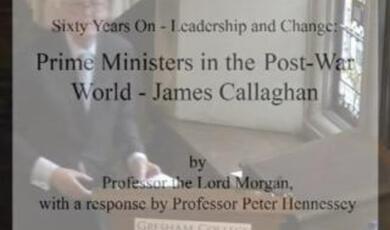A symposium to mark the 400th anniversary of the King James Version of the Bible.
Professor Tim Connell introduces the symposium, offering an overview of historical attempts to translate the Bible and outlining the impact of the publication of the King James version.
26 September 2011
Introduction to The Language of the King James Bible
Professor Tim Connell
Welcome to the Gresham Symposium on the King James Bible, which is the modern name for the Authorized Version of the Bible, commissioned by King James I and published in 1611.
There has been a quite remarkable response this year to the four hundredth anniversary of its publication. Apart from any theological points, a lot of emphasis has been placed on its work not only as a piece of literature (a key topic for us today) but also because of its impact on the English language. David Crystal has identified no fewer than 257 phrases that have passed into common use, ranging from Let there be Light through to Faith, Hope and Charity, and encompassing such everyday terms as “by the skin of one’s teeth”, “fly in the ointment” and “no peace for the wicked”, let alone “be afraid, be horribly afraid” – which most people attribute to St Arnold Schwarzenegger.[i]
The whole process of the translation of the Bible into English takes place over a long period of time, and much of the King James Bible, it must be said, has its roots in the work of John Wyclif and William Tyndale, not to mention Miles Coverdale. The Great Bible, the Bishops’ Bible and the Geneva Bible with its controversial notes in the margin were all forerunners, but it was the King James which finally won the day as the definitive translation in English, as well it might, given the detailed work of the companies set up in Oxford, Cambridge and Westminster. These companies comprised the most eminent men in the land, who were not only fluent in Hebrew, Greek and Latin, but who could also polish off lesser known (but no less critical) languages such as Syriac, Arabic and Aramaic.[ii]
The need to get back to the original texts and review their meaning developed with the growth of Ancient Greek, a key feature of the Renaissance. John Colet, dean of St Paul’s and an eminent scholar, put himself at some personal risk for not only translating the New Testament from the Greek, but also for reading his translations out loud to crowds of thousands (literally) at St Paul’s Cross, and no less a person than Erasmus of Rotterdam (a great friend of Colet’s and of Sir Thomas More) also produced his own version.
The wider understanding of Hebrew as well as Greek led to the realisation that the Vulgate edition in Latin contained misprints as well as misreadings, and the invention of printing led to greater literacy, a greater availability of reading material, and hence a demand not only for religious tracts, but also the Bible in the vernacular. Let’s look at a couple of texts to demonstrate this point:
In principio erat Verbum, et Verbum erat apud Deum, et Deus erat Verbum. Hoc erat in principio apud Deum. Omnia per ipsum facta sunt: et sine ipso factum est nihil, quod factum est. In ipso vita erat, et vita erat lux hominum: et lux in tenebris lucet, et tenebrae eam non comprehenderunt.
And the second:
1 Ecce Ursus scalis occipite gradus pulsante post descendens.
2 Est quod sciat unus et solus modus gradibus descendendi, nonnunquam
autem sentit, etiam alterum modum exstare, dummodo pulsationibus desinere
et de eo modo meditare posit.
3 Deinde censet alios modos non esse.
4 En, nunc ipse in imo est, vobis ostentari paratus. Nomen audiens primum, sicut
vos dicturi estis, etiam ego dixi
The first text, you will have realised, is the Gospel according to St John chapter 1, and the congregation usually stands when it is read in Church. The other text is more commonly read lying down, though it is a sacred text too in its own way, and all of you will know it off by heart. It is, of course, the opening chapter of Winnie the Pooh in Latin – and classic bedtime reading! I think the case for translating the Bible into English is proven.
However, this was far from the case in the 16th Century. Translating the Bible into English, it has to be said, was a highly controversial matter. Wyclif’s bones were even dug up and burnt forty years after his death, and even William Tyndale was burnt at the stake only a few years before Henry VIII’s Great Bible was placed in every English parish church. However, the difficulty of having the Bible only in Latin was first noted by none other than Alfred the Great, who noted the number of priests in his kingdom who did not actually know Latin. His response was to set up translation as a subject at Winchester, a fact we should note especially as today (26th September) is the European Day of Languages.[iii]
It has to be said that the King James Bible when it appeared in 1611 was far from perfect. Demand was so strong that printers worked in teams to produce folios that were then bound together, sometimes even in the wrong order. There were also some notorious misprints, of which the most celebrated appears in the Wicked Bible, where the word “not” is omitted from the Seventh Commandment, thereby making adultery compulsory.[iv] The other error which cheers up members of the Stationers’ Company (who were heavily involved in the original production) comes in Psalm 119, which reads “Printers have persecuted me without a cause”, which should of course read “princes”.[v]
The other problem lies with the use of language which, however sacred, is also archaic. The King James Bible had the ring of earlier times to it quite deliberately, as about 80% of it is drawn from Tyndale’s efforts of eighty years before, which in turn draws on a surprising amount of Wyclif, so the problem is likely to be even more acute four hundred years later. I well recall my daughter coming back proudly from Sunday School at the age of 7, and telling me that she had learnt the Lord’s Prayer. There was a pause, and she asked, “Daddy, you know ‘Give us this day our daily bread?’ Yes... “Well, is this why we call God Jehovis?” Worse (or quite possibly better) came from her little friend who solemnly assured me that she knew God’s first name. I thought I had better ask, and she said, “It’s Harold”. Harold? Indeed – it is in the Lord’s Prayer too: “Our Father which art in Heaven, Harold be thy Name...” As someone more versed in theology than me once said, “Out of the mouths of babes and infants....” [vi]
It does however indicate a practical difficulty, and this is a topic that we will be able to discuss today. Even if the tone and style of the King James version were slightly archaic,[vii] the translators say in the preface, “We desire that the Scripture may speak like itself, as in the language of Canaan, that it may be understood even of the very vulgar”, which in turn echoes Tyndale’s point about the boy who drives the plough.[viii]
It is perhaps for this reason that the companies of translators who met at Stationers’ Hall in 1611 to finalise their work read it out loud to each other. Certainly there are verses which are pure iambic pentameters, and there is a legend that Shakespeare himself translated Psalm 46, but the text has a resonance which gives it power to this day in everywhere from school assembly to the local parish church. I was put in mind of this a few years ago, when I was due to go into hospital for a small operation. The text in church that Sunday was John 5:8, Take up Thy Bed and Walk,[ix] which I took to be a good omen. However, in the New Revised Standard Version of 1989 we are given Pick up your Stretcher and Go Off Home. Now, if anyone were to say to me, “Take up thy bed and walk”, believe me I would. But if anyone were to say Pick up your Stretcher and Go Off Home, I would probably reply, “Oh, OK then, if you say so.” It just does not have the same impact, does it? There are so many phrases that people know almost instinctively, and people are very slow to accept change, as with the modern Anglican rendition of the Lord’s Prayer or the controversy arising from the new translation of the Roman Missal, which have both left a lot of people feeling uncomfortable in the pews.[x]
We should also perhaps take note of other sources of religious inspiration, which in turn draw on the King James text, and which all form part of a single spectrum: Pilgrim’s Progress, and Hymns Ancient and Modern.
John Bunyan’s Pilgrim’s Progress was published in 1678. It was translated into 200 languages and has never been out of print. It has added phrases to the language such as the The Slough of Despond and The Celestial City, and reinforced well-known biblical quotations such as the Valley of the Shadow of Death, let alone that bit about hobgoblins and foul fiends in verse 4.[xi]
The impact of favourite hymns drawn from the King James text, should not be under-estimated as a way of keeping particular lines in the popular mind, and this has perhaps reinforced their role in the wider language. Psalm 23 and “The Lord’s My Shepherd” are prime examples. Of the books in the Bible, John wins by a short head over Luke, having given us such favourites as “O Come All Ye Faithful”, “Guide Me O Thou Great Redeemer”, “The King Of Love My Shepherd Is” and “Rock Of Ages”.[xii]
Hymn singing, of course, was much more part of everyday life even a few years ago, and the constant repetition of verses to memorable tunes will undoubtedly have stayed in people’s minds, even if popular hymns such as “Love Divine All Loves Excelling” is not easy reading for the very young. I often wonder how many of the memorable words and phrases identified by David Crystal have in fact crystallised in the popular language via well-known hymns.
Today we have a panel of experts to look at the language of the Authorized Version, the King James Bible. We will be looking at it from a number of angles, culminating in a debate at the end of the afternoon, as to whether the KJB is great literature or a divine source.
-------------------------------------------------
[i] See Appendix 1 of Begat (OUP 2010).
[ii] See Gordon Campbell (2010) Bible: the story of the King James Version, 2010, Appendix 1 page 276.
[iii] Melvyn Bragg (2003) The Adventure of English Sceptre p29.
[iv] The printer, Robert Barker, was actually Master of the Stationers’ Company. He spent two years in the Tower of London, not as a punishment so much as to keep him safe from his wife.
[v] For a full list of misprints see Bible Errata in Wikipedia at http://en.wikipedia.org/wiki/Bible_errata#King_James
[vi]Psalm 8 verse 2. Actually the KJV has “babes and sucklings”. “Suffer little children” (which also springs to mind) occurs twice, in Matthew 19:14 and Luke 18:16.
[vii] Bragg 2003 page 134.
[viii] This refers to the level of illiteracy in England at the time, which in the view of Thomas More and others made an English version of the Bible unnecessary.
[ix] When Christ visits the pool of Bethesda and cures the man who had been ill for thirty-eight years.
[x] See http://www.thetablet.co.uk/blogsub.php?id=176&ti=17for some forthright views from rank and file Catholics.
[xi] Bunyan himself, of course, wrote “He who would valiant be” as a hymn, even though it first appeared as a poem in Pilgrim’s Progress, with the opening line of “He who would true valour see”, quoted by Mr Valiant-for-Truth to Mr Greatheart. He re-wrote it as the hymn we know as “He who would valiant be”, but this was revised for the English Hymnal in 1906 by the Rev. Dr Percy Dearmer, with help from Ralph Vaughan Williams, who composed the tune. He it was who switched the first line back to He who would true valour see, and cut out the hobgoblins and foul fiends who appear memorably in the fourth verse of the original.
http://www.oystermouthparish.com/who-would-true-valour-see
[xii] See the useful scriptural index of the Catholic Celebration Hymnal for Everyone, McCrimmon 1994, pages 329 – 338.


 Login
Login







